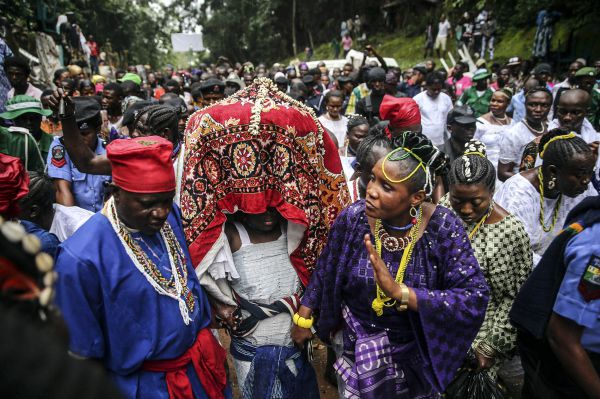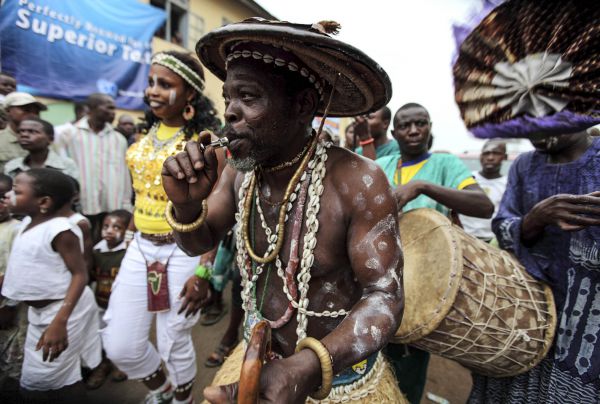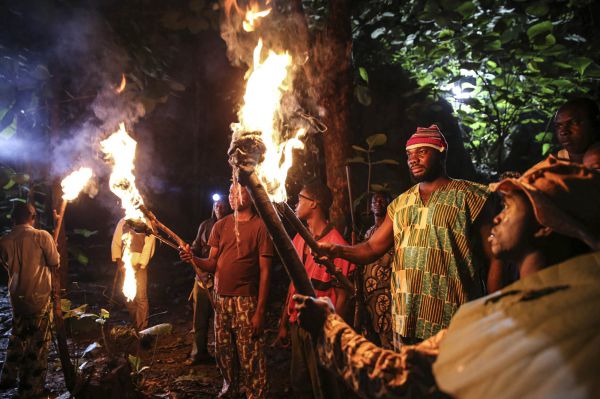Eyo masqueraders marching in Lagos represent the spirits of the dead.
Shola Lawal in Ibadan
Nigeria is a secular state, but religion nonetheless dominates social and political life. Almost 49% of the 186-million-strong population is Muslim, spread largely over the north, central and southwest regions. Christians, who account for 48.3% of the population, live mainly but not exclusively in the south of the country.
Overshadowed by these two faiths, another group of worshippers is forgotten, and often marginalised: they are the adherents of Nigeria’s traditional religions.
Not all Nigerians accept that freedom of religion extends to the country’s indigenous religions as well: in Nollywood movies, for example, traditional worshippers are often depicted as satanic.
Believers face an uphill battle to persuade the government to implement inclusive religious policies, including to recognise traditional religious holidays. But despite these struggles, the old gods still very much exist thanks to people such as Iyalorisa Omitonade Ifawemimo, who are helping to keep them alive.
Father of secrets
At the age of five, when her friends trudged behind their parents to churches and mosques, Ifawemimo began to memorise the Odú Ifá — the 16 chapters of the Ifá corpus. That same year, her initiation into traditional Yoruba religion would begin. As with her four siblings, her father, Omikunmi Olorisa Egbelade — an orisha (deity) devotee and a babalawo (a priest of the Ifá oracle) — had ingrained in her the importance of learning about Ifá, Yoruba spirituality and, most importantly, passing it on. He taught her exactly the way his father had taught him decades ago, when he was a boy.
Omikunmi and his father bore many similarities; his father was also a babalawo, or “father of secrets” as Baale Omikunmi likes to call it. A babalawo is a priest appointed to communicate with the gods on behalf of others.
At home in Nigeria, Omikunmi boasts some solid achievements. He is the head of the Isese Foundation, an advocacy group for all traditional religion worshippers in Oyo State and the country. In Ibadan, where he lives, he is also the Baale Yemoja — the chief priest of the goddess of water.

[Worshippers of the river goddess Osun (above and below) parade in her honour in Osogbo, southwest Nigeria. The annual cultural festival draws tens of thousands to honour the goddess, who is believed to bring divine favour and fertility. (Akintunde Akinleye/Reuters)]

The Baale’s father had insisted on sending his son to school for a reason: no one would cheat his son the way he had been cheated. The older Baale’s generation experienced first-hand the effects of the British invasion and the almost total stripping of indigenous culture from the minds of the populace that followed. As culture disappeared, Ifá worship did too. The church pulled people away from Olodumare, one of the manifestations of the Supreme Being, in their thousands, and labelled traditional practices as “fetish” and sinful — practices such as the consultation of Ifá, for example, and bowing to a man-made statue for another.
It was a period of shocking cultural change for the Baale’s father’s generation. The subtlety of religious colonialism was insidious, especially when mixed with Western education. And where the gods promised swift retribution for sinners, the white man’s god gave sinners a free pass, promising infinite forgiveness and showing no will to strike liars, thieves and fraudsters on the spot the way Sango, god of thunder, would have done. And so sin they did — in abundance. Nothing made sense, except that the Baale’s father quickly noticed how the educated seemed to prey continually on those who were not literate, and vowed that his son would not suffer the same fate.
The mother goddess
Ifawemimo graduated in 2014 with an economics degree from the Obafemi Awolowo University in Ile Ife in southwest Nigeria.
At the age of 20, she was officially made a Yemoja high-priestess. The initiation ceremony involves a number of spiritual activities. One requires that the woman shave her head and walk through the streets with a pot on her head. Before the initiation a divination must occur to reveal a person’s taboos, strengths, weaknesses and destiny.
As a full-time Ifá devotee, one of Ifawemimo’s duties is to perform divination for others, to consult the gods on behalf of the new worshippers and to determine which god they should be devoted to.
Divination is so important in Yoruba tradition that it is done “before a betrothal, before a marriage, before a child is born, in times of sickness, at any and all times”, according to a Professor Oduyemi in a 2016 lecture. After the akosejaye — the divination exercise that shows the full scope of one’s life, the ups and the downs — a baby’s taboos are identified and noted. But most importantly, the baby’s guardian orisha is revealed. As a three-day-old baby, Ifawemimo’s guardian orisha was revealed as Yemoja.
Yemoja is only one of the deities or orishas in Yoruba religion: there are as many as 400.
The Yoruba people, a major tribe in the West African region who are found mainly in Nigeria but also spread across Benin and Togo, have practised the Yoruba religion for centuries. In the 19th century, slaves taken from West Africa to work on South American plantations were forced to syncretise Yoruba religion with Roman Catholicism to avoid damnation by their masters. Although commonly perceived as a form of polytheism, adherents of Ifá such as Ifawemimo insist that they do believe in a Supreme Being — Olodumare — who created the heavens and the Earth and all the other smaller gods so that mankind can consult him through them.
Another high-ranking orisha is Obatala, the husband of Yemoja, with whom he is believed to have made all the other orishas that exist. There’s also Ogun, the god of iron; Sango, the god of thunder; and Oshun, the deity for fertility and love.
Oshun is the deity most often referenced by the African diaspora. In a performance at the Grammy awards in 2017, a pregnant Beyoncé paid tribute to Oshun. The deity also appears on her song Lemonade.
“I like to call them ministers,” says Professor Jacob K Ayantayo, the department head of religious studies at the University of Ibadan, Nigeria’s first university college. “They are the smaller ministers appointed by Olodumare himself, each with his own portfolio (or element of nature) that he controls.”
Ifawemimo’s shrine is nested in a small, square house with a courtyard the size of half a tennis court. At the back is a separate space where Esu, the god of mischief, is domiciled, away from the shrine, sitting beside Egbe, another orisha. Esu’s space is different because ‘‘he is a boss, the main guy’’, she jokingly points out.
“We call him the god of chances and change — he is not Satan and he doesn’t do bad,” Ifawemimo stresses. In Yoruba religion, Esu is believed to be a trickster, a smart and cunning god who appreciates a good joke and who loves to cause good-natured chaos.
But his reputation in contemporary Yoruba culture has taken a huge beating. Google faced a backlash from the Yoruba community for misrepresenting Esu as the devil on Google Translate. So when Nigerian linguist Kola Tubosun had the opportunity to work on a language project at Google in 2015, he knew he had to grab it.
“The missionaries just decided that Esu would be the unfortunate fellow to become the carrier of the devil,” Tubosun says matter-of-factly. He facilitated the changing of the previous meaning of “Esu” on Google Translate, using “Bilisi”, the Yoruba word for evil, in its place.
Tubosun’s background explains why he has appointed himself as a guardian of Yoruba language — he grew up close to his grandparents in Ibadan, a prominent Yoruba city, and his environment imprinted a love for language and culture in him.
In keeping the Yoruba language alive, as he does now — digitising and documenting it for a new generation — Tubosun is also keeping Yoruba religion alive. Indeed, one cannot practice Ifá without understanding the Yoruba language.
Tubosun has developed a dictionary site for Yoruba and is working on doing the same for other major Nigerian languages such as Igbo and Hausa. But his work with Google, albeit brief, is one of the things he is most proud of.
The new school
Though not quite in the category of a millennial, Ifawemimo is as much a social media addict as the next person who has access to the internet. Her phone is the first thing she reaches for every morning, patting blindly around her bed before she even opens her eyes. “I can’t do without it,” she says, self-deprecatingly.
“Ifá is the esoteric word of Olodumare,” the high priestess explains in one Instagram post. Although it has been described as a great many things, a great many times, many religious scholars agree that Ifá is essentially a collection of oral verses, parables and anecdotes that make it possible for appointed priests and priestesses to consult Orunmila, who is the sole interpreter of Olodumare’s divine message and the intermediary between Olodumare and mankind.
READ MORE: Art boom feeds revival of ancient rites
“Social media has really helped me get in contact with people of like minds,” Ifawemimo says. “[Some of them are] lovers of culture and tradition, [who] don’t necessarily practice it but who have fallen in love with it anyway.”
But these cases are few: because traditional religion worshippers have such a negative reputation in Nigeria, many responses are harsh. “Most times people will bully me, [saying] that I am an idol worshipper, I am fetish, devilish,” Ifawemimo says.
The shrine keeper
At exactly 4am every day, Efunleye wakes up to tend to the shrine and the gods in it. First, she cleans out the shrine, wiping the tiled floors of the small, square room until they shine. Then she “feeds” the gods, setting their offerings before them —each god has a favourite item (Esu, the mischief maker, is fond of candies and sweets).
Efunleye first came to the shrine about four years ago. She remembers vividly how her life started to crumble while she worked as a prophetess at Christ Apostolic Church, a Pentecostal church in Nigeria with more than a million members. The collapse of her previous life was gradual at first, her financial ruin subtle, until even eating became hard to do. It was then that spiritualists revealed how her mother had begged desperately for a child from Obatala. The orisha granted her mother a baby girl, fair in complexion, but with one condition: the girl had to serve him when she was of age.
Efunleye has been more than happy since she arrived at the shrine, she says, even though her husband refused to move with her. But “the gods are husband enough”, she says, laughing good-naturedly and pointing to the shrine.
Efunleye rarely leaves the shrine because she must never miss her morning routine, so it’s easier to live there. Her daughters come to visit her daily — they live in an apartment not too far away. They had supported her four years ago when she told them what she had to do. Now they are also Ifá devotees, assigned to Yemoja, the same deity as Ifawemimo.
Ifawemimo’s shrine is the very antithesis of how shrines are portrayed in Nollywood movies. There are no skulls, no red cloths, no baby bones. There are wooden statues on the floor but they are merely decorative, Ifawemimo is quick to point out
“This is not a Nollywood movie,” she repeats over and over, eager to displace preconceived notions of shrines as places where only evil is done.

[Nigerian actors on the set of a Nollywood production. The country’s film industry has been criticised for often portraying traditional belief systems in a negative light. (Akintunde Akinleye/Reuters)]
From here she has helped women have children. She has helped people discover their taboos, their destiny. From here she has healed the sick, righted the paths of those who had veered off it. And that makes her happy. Except when these same people head to churches and mosques after their “healing” to give testimonies. Then it hurts.
A people put down
The Baale is more angry than hurt. Sitting in a smaller, private parlour off the courtyard where he takes visitors, he bristles visibly. By now he should be used to hypocrisy from people but the government, he says, makes things worse, and it goes high up, all the way to the federal level.
What kind of government constitutionally claims to be secular but in practice is not? he asks. What kind of politician sells promises of representation to traditional religious worshippers only for votes? Why aren’t there any schools for cultural studies managed by Ifá devotees, who are properly versed in it?
It is even worse, the Baale reckons, that the government refuses to support traditional religions in the same the way that it supports Christianity and Islam, which are both foreign. For both religions, several public holidays are set aside every year to commemorate key dates. Yet there aren’t any national public holidays for traditional religion worshippers.
The Baale and other members of the Association of Traditional Religion have been fighting for an annual holiday, specifically August 20, when the Isese festival is held.
It is ridiculous, he thinks, that anyone needs to fight for traditional religions to be recognised in the country where they originated. It baffles him that, although Nigerians at home ignore their culture and religion, white people and Africans in the diaspora are increasingly interested in it. And although young people back home use the spiritual powers they are introduced to for fraudulent activities and “419” — the internet scams for which Nigeria is infamous — these people are different. “They count the religion not as a money-making venture but as a source of success in their lives.”
The Baale is sitting forward in his chair now, hands gesturing in time to his words. It’s the inability of the people to recognise their roots that continues to cause religious conflict in the country, he says. Historically, Ifá devotees did not experience religion-specific conflict. Even though they have different guardian orishas, they all worship together and have mutual respect for each other’s practices. Nigerians must go back to their religion and their roots, he warns — “if we can’t, then no rest”.
Someone asks him: “And the notion that the babalawo is evil, is it true?”
“Who says that?” He rebukes his questioner. “Nollywood only wants to sell their movies. Babalawos are not evil. We are the fathers of secrets.”